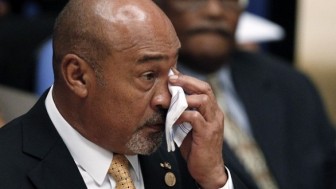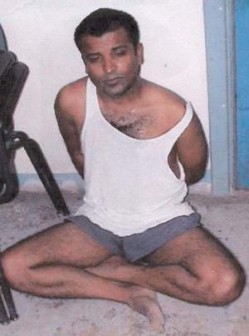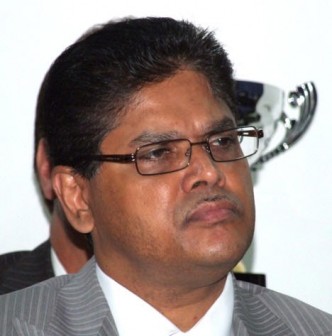Now Surinamese President Desi Bouterse remained involved in the drug trade after his conviction for drug trafficking in The Netherlands in 1999 until 2006 and was also cooperating with Guyana’s notorious drug lord Roger Khan, diplomatic cables carried in Dutch paper NRC Handelsblad reported today.
The report was based on WikiLeaks cables that had been sent by US diplomats.
Radio Nederlands reported that the cables indicated that the Surinamese president was involved in drug smuggling until 2006, when he was still an MP. He allegedly had links to Shaheed ‘Roger’ Khan, Guyana’s biggest drug baron, who is currently serving a prison sentence in the United States.

A spokesperson for President Bouterse told RNW correspondent Harmen Boerboom that he did not think the revelations would pose a problem for the president. “He is democratically elected by the Surinamese people.”
Voters already knew that Bouterse had been convicted of drug smuggling in the Netherlands and that he is suspected of giving the order for the December murders, in which 15 members of the opposition were killed in 1982 during an earlier term as president.
Radio Nederlands said that the ‘cables’ report a number of locations where Bouterse and Khan are believed to have met. Bouterse also visited Guyana a number of times in spite of an international warrant for his arrest.

The report said that the two men are believed to be involved in various murders and plots to murder former Surinamese Minister of Justice Chandrikapersad Santokhi and procurer general Subhas Punwasi, who were responsible for a clampdown in drug crime. Santokhi had been in charge when Khan was arrested in Suriname for drug trafficking. It was from Suriname that he was spirited out to Trinidad and handed over to the American authorities.
The cables do not reveal whether the President Bouterse was involved in drug crime after 2006.
The report said that Khan, who was held in Suriname in 2006 after a manhunt was launched for him in Guyana, organized, according to the U.S., “gun-for-drugs deals for the Colombian rebel group FARC. Bouterse and Khan were also involved in “murders and planned murders’ at home.
The Dutch report said that a cable from the US embassy in Paramaribo based on “sensitive sources” by Ambassador Marsha Barnes delineated what Khan and Bouterse each had to offer. For Bouterse it was “the means to supplement his income with drug trafficking. ” The crackdown against drug trafficking by Santokhi would have squeezed Bouterse. “That forced him to new partners like Kahn to shake hands, ” says Barnes. In diplomatic correspondence, Khan’s name has often been incorrectly spelt as Kahn. In return, Khan had access to “Surinam criminal elements and structures” through Bouterse. He also had “easy access to scheduled shipment of drugs to Europe” and protection in Suriname.
The relevant cables come from the US embassies in Paramaribo and Georgetown.
In Paramaribo today, Santokhi declined to comment on the alleged involvement of President Bouterse in a plot to kill him but he did affirm that Khan was perceived to be a significant threat to the Surinamese state.

The Dutch news agency, ANP today said that Santokhi, the former Minister of Justice in Suriname at the time he would have been allegedly targeted, would not comment on the report that Bouterse was involved. He however had this to say about Khan.
”I had as minister said he was a danger to law enforcement agencies including the highest authorities in Suriname,” Santokhi told ANP.
Santokhi is currently chairman of the CICADA, the anti-drug organization of the Organization of American States. Santokhi was nominated for this position by President Bouterse which observers say makes it very awkward for him to say anything about the Surinamese President.
ANP said that Khan’s arrest in Paramaribo in 2006 led to violent protests in the Surinamese parliament. The National Democratic Party (NDP) of Bouterse reacted angrily to the extradition of Khan to the United States, it said.
Roger Khan
Khan was sentenced to 30 years imprisonment on charges of drug smuggling, witness tampering and gun possession in Vermont in October, 2009 at the US Eastern District Court in Brooklyn.
Justice Dora L. Irizarry, imposing the sentences after a one-hour summation, said that they would run concurrently, which means that Khan will only serve 15 years in prison.
The sentencing brought a climax to Khan’s case which had riveted the country as explosive information linking the Guyana government to the once powerful and violent drug lord was revealed. Khan’s famous and now convicted lawyer’s trial had been similarly revealing. Among others, the revelations linked Health Minister Dr Leslie Ramsammy to Khan and implicated him as being the government official authorizing the importation of the now infamous spy equipment to Guyana. Ramsammy has repeatedly denied any links to Khan.
Khan had pleaded guilty, almost three years after he was held in Suriname, to conspiring to import cocaine into the US, witness tampering and gun running.
Khan was charged with conspiring to import cocaine into the US over a five-year period from January 2001 to March 2006. The US government had said he was the leader of a cocaine trafficking organisation based in Georgetown. It also asserted that he was able to import huge amounts of cocaine into Guyana, and then oversee exportation to the US and elsewhere.
The US government had charged that a significant amount of the cocaine distributed by Khan went to the Eastern District of New York for further distribution. As an example, it cited a Guyanese drug trafficking organisation based in Queens, New York, which it said was supplied by Khan. The Queens organisation was said to have distributed hundreds of kilos of cocaine in a two-month period during the spring of 2003.




